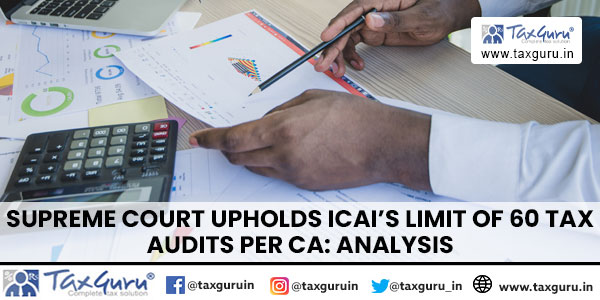Introduction
In a recent case we might have saw Supreme court giving judgement regarding contravention of constitutional right due to imposing of maximum number of tax audits by ICAI
What Supreme court did here?
Has it removed ceiling limit of 60 Audits?
In this article we are going to discuss a recent landmark decision of the Supreme Court of India where it upheld our Institute, The Institute of Chartered Accountants of India’s which imposed the limit of maximum 60 tax audits per Chartered Accountant.
This ruling, was given by Justice B. V. Nagarathna and Justice Augustine George Masih, and will be having a significant implication for our accounting profession and in the matters of taxation and tax audits in India.
Let’s discuss crux of the case as well as the implications of the same on Chartered Accountants and stakeholders.

What is the case all about?
The case, Shaji Poulose v. Institute of Chartered Accountants of India, focussed one thing that is the imposition of a ceiling limit of 60 tax audits i.e. maximum number of tax audits a CA can undertake, as given by the ICAI. The above issue of imposing limit on tax audits questioned on whether this limit impacting upon the fundamental right of CAs in practice and their profession as per the Article 19(1)(g) of the Indian Constitution.
What is Article 19(1)(g) of the Indian Constitution?
Article 19 (1) (g) of Indian Constitution provides Indian citizens the right to practice any profession or to carry on any type of legal occupation, trade or business, subject to Art. 19 (6) which provides a separate list of items or practices that are in the nature of restriction which can be imposed by the state upon the above right of the citizens.
What were the key Arguments in the case?
In short, In above case the decision of Supreme Court’s was as per the question of law which was trying to distinguish between a ‘right’ and a ‘privilege’ which was concerning the practice of accountancy.
The Court emphasized that conducting mandatory Income tax audits as per the Section 44AB of the Income Tax Act, 1961, have not been an inherent right, but this is a statutory privilege that is extended to Chartered Accountants. Hence, the court concluded that the imposition of a upper limit of 60 tax audits by ICAI does not questions upon the fundamental right to practice the profession.
What is 44AB?
Considering main provision, as per section 44 AB of the Income Tax Act, 1961 the audit of accounts as per Income tax is mandatory if, the gross turnover of business exceeds Rs. 1 crore in any preceding year, or gross receipts are more than Rs. 50 lakh in case of profession in any preceding year.
What is the significance of Section 44AB?
Section 44AB of the Income Tax Act, 1961 facilitate the assessment processes of revenue department or Income tax department, which has been highlighted as a statutory provision. Hence in this case the Supreme Court underscored that the privilege which is granted to Chartered Accountants to conduct tax audits as per this section is subject to the reasonable restrictions which is imposed by ICAI in the public interest to ensure quality.
Hence in this case, the Supreme Court made it clear that when a privilege is granted by a statute, which could potentially be revoked entirely, then the reasonable restrictions may be imposed. Hence in the judgement the limit of 60 tax audits which was imposed by the ICAI was deemed as such a reasonable restriction, falling within the scope of Article 19(6) of the Indian Constitution.
Due to legal uncertainties which were caused by the conflicting judgments and the ongoing case in the Supreme Court relating to the upholding of the validity of the ICAI’s guideline on limiting tax audits, the Supreme Court deemed it effective only from April 1, 2024.
What are the implications and future course?
The Supreme Court’s decision have the important implications for our accounting profession and compliances related to taxation in India. It approved the matter raised by the regulatory authority of the ICAI while ensuring the balance between professional interest as well as the public interest. Moreover, the Court’s reservation of power of the ICAI to amend the guidelines in the future depict the dynamic nature of these regulatory frameworks which were in the response to evolving circumstances.
Conclusion
In conclusion, the Supreme Court’s judgement in the case of Shaji Poulose marks a significant milestone in the regulation of tax audits by The Chartered Accountants in India. By upholding the ICAI’s limit on tax audits and elucidating the distinction between rights and privileges, the Court has provided a clarity on the scope of professional practice in the domain of accountancy linking it with Indian constitution. However, the implications of this decision and its interplay with future regulatory developments will be closely watched by stakeholders in the accounting and taxation sectors.





